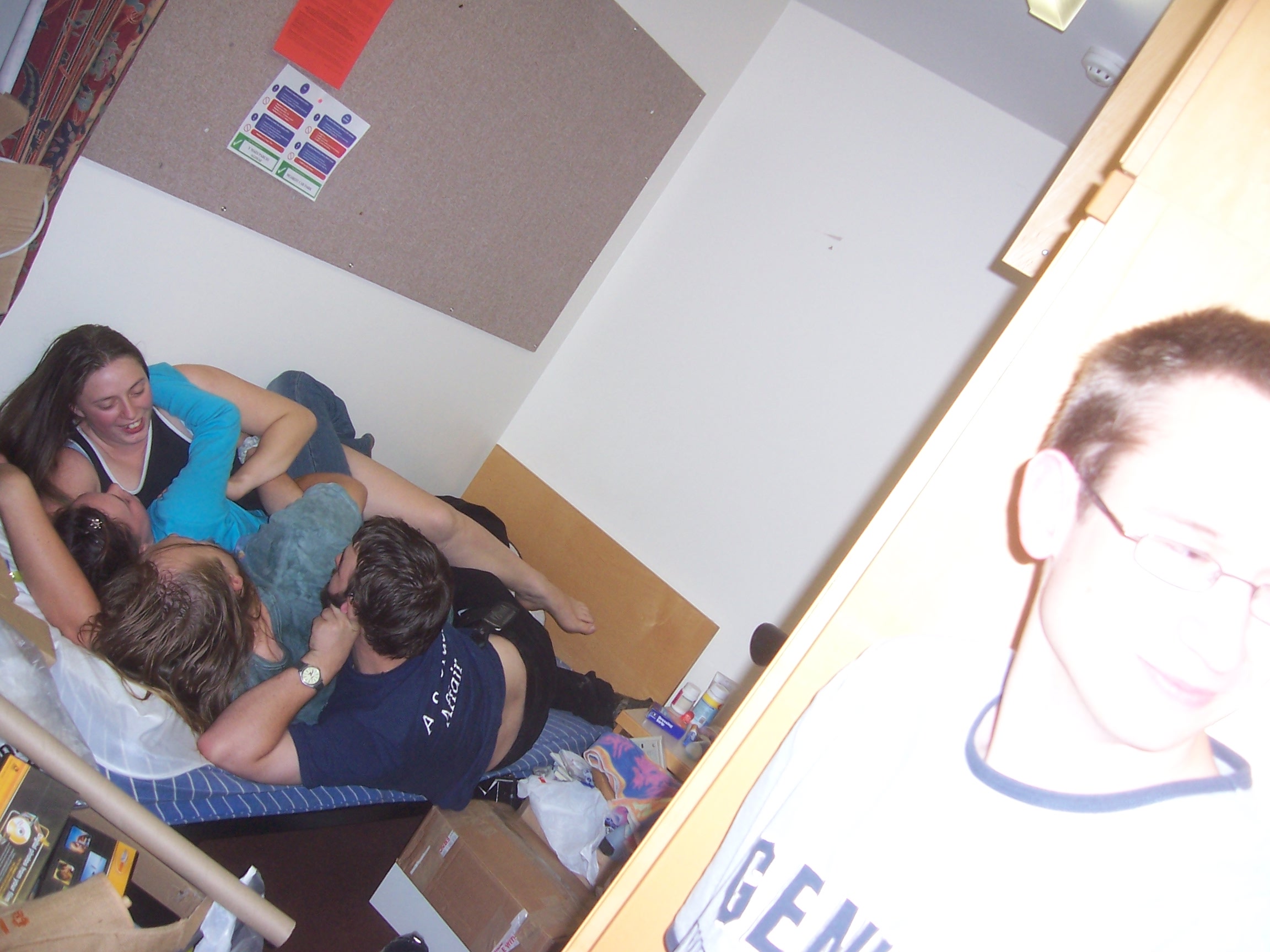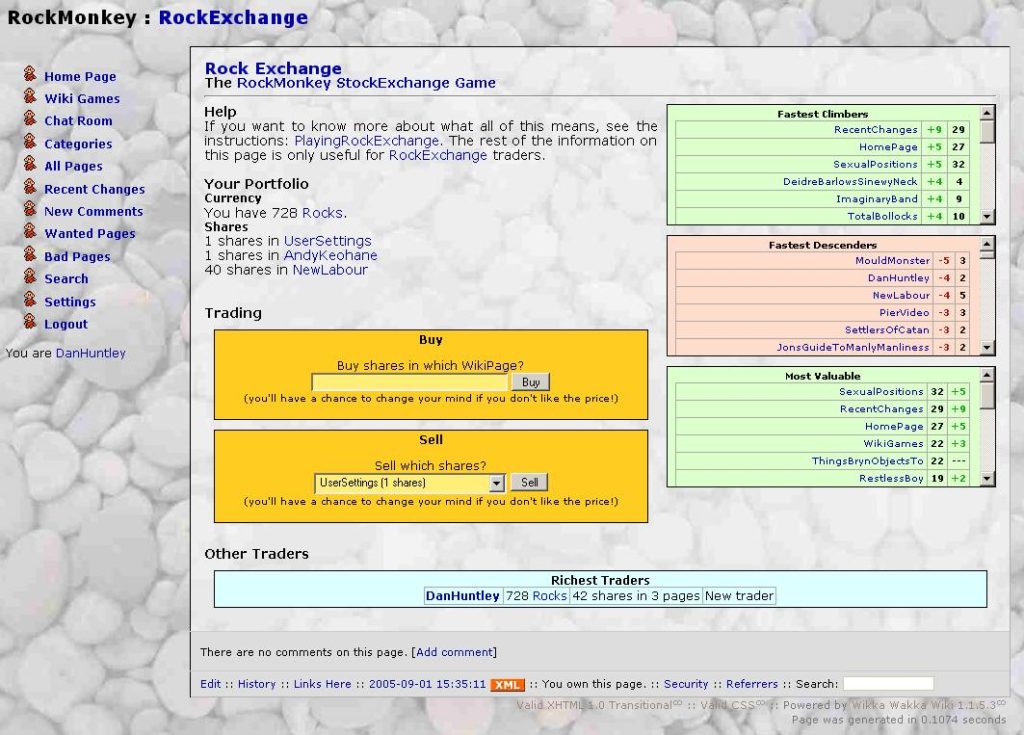Last night really works as a great example of the ‘Aber Effect’. Claire and I went along to Sundeep‘s housewarming party, where she was feeding curry to her housemates and those of us who came along to welcome her back into
Aberystwyth. I’d also promised to help sort her computer out with an internet connection, but I’d forgotten to take the network card I’d agreed to lend her.
Having eaten, as some folks were packing up to leave, I suggested that Claire and I go and pick up the network card from The Flat, then come back and install it into Sundeep’s
PC. That’s when we heard about Sundeep’s flatmate, who’d managed to lock himself out of his room. So we went back to The Flat and picked up
the network card and also a set of lockpicks and a can of oil, and so when we got back Claire was able to install the
network card while I picked the lock of the housemate’s room.
Having succeeded in my lockpicking attempt (after some jiggerypokery with the lockpicks and a filed-down Somerfield saver card [knew those things would come in handy]) and opened the
room, the housemate offered Claire and I a pint in Scholars, which we accepted. Leaving Sundeep, we joined him and some of the other housemates in the pub for a congratulatory pint each
of Old Speckled Hen.
And that’s where we bumped into Matt (in the hat), Andy K, and a friend of Andy’s who will henceforce me known as MOT.
Jokes about having to renew him every year aside, we explained our plan to return to The Flat and decant the wine we’ve been brewing in our wardrobe for the last fortnight, and invited
them to come join us when they’d finished their drinks. Then, needing to get a head start on them so as to start processing the wine, we set off.
On the way home, we were greeted by two separate groups of strangers, the first of whom overheard our conversation and with whom we briefly debated “the Aber effect”, and the second of
whom wanted to use their camera phone to take a picture of Claire and I (although we’re not quite sure why).
We siphoned the wine into bottles, dissolved some fine sugar into it (the yeast had been somewhat overenthusiastic over the first few days and had made the wine slightly bitter and
extremely alcoholic), and corked them, right on time for Matt, Andy, and MOT to arrive. We lounged, and drank wine, and were joined by JTA and Gareth, with whom we watched a few episodes of American Dad and listened to some music while the wine kicked in. Which it did, quite remarkably.
So, from a housewarming in Llanbadarn we met a guy who’s lock I picked for which he bought me a pint at a pub where I met some guys I knew and a guy I didn’t who came back to my flat
where we drank homebrew wine with some folks who were at the party to begin with. This is the essence of the Aber Effect. And I love it.

























Forcing people to have deliveries sent to their registered address cuts down on card fraud, which is moderately freqent at mail order computer hardware stores on account of the high value, discreetness, and availability of the goods. It’s not possible to accurately perform such checks on credit cards, but it’s easy to with debit cards.
Many banks give special dispensation on their student accounts; allowing them to – for example – submit two addresses which they will automatically switch between throughout the year – or allow two registered addresses to function for card checks (while still delivering the statements to one). Ask your bank if they can do this, and, if they can’t, write a letter to inform them that there are banks that can. If you’re not willing to let your feet do the talking, there’s no way to let these large organisations listen to you.
There’s no reason not to own a credit card unless you feel you cannot trust yourself to do so – or the banks won’t give you one! For many such cards, there is no interest if you pay them off immediately each month (which can be automated thanks to wonderful schemes like Direct Debit): this increases the flexibility of your purchasing power (particularly when purchasing from overseas) without costing you a penny. On a side note, owning one that you only ever use in this fashion increases your credit rating (which is checked when buying a contract mobile phone, getting a mortgage, applying for credit on a car, or whatever). Just for examples’ sake; if you owned an unused credit card, you could have ordered these computer parts and – odds are – immediately transferred the money from the bank account to the card, thereby giving you the bits sooner.
All of that said, I think I’ve quite aptly (and almost entirely) undermined the sense in preventing expensive goods being delivered only to the registered cardholder’s address, because as we’ve just seen there’s always a way to circumvent such checks by routing the money other ways: this leaves a longer paper-trail (banks and credit companies are, by law, required to keep better records for longer than companies that happen to process card transactions), but is otherwise a sensible way to commit fraud without triggering the little alarm bells that debit cards have hanging from them. So yeah; perhaps Scan should be a little less draconian.
Now Chip-And-PIN in the UK: there’s a flawed, insecure, badly-implemented system.